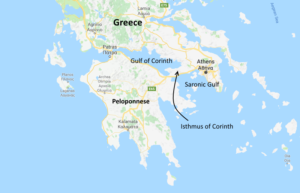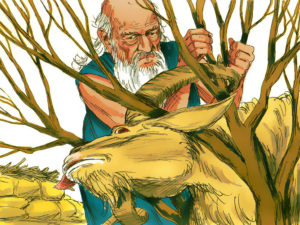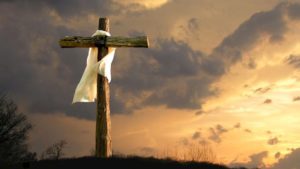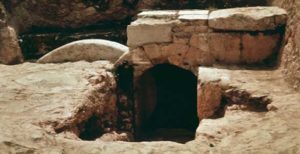Matthew 21:1-10
1 As they approached Jerusalem and came to Bethphage on the Mount of Olives, Jesus sent two disciples, 2 saying to them, “Go to the village ahead of you, and at once you will find a donkey tied there, with her colt by her. Untie them and bring them to me. 3 If anyone says anything to you, say that the LORD needs them, and he will send them right away.” 4 This took place to fulfill what was spoken through the prophet: 5 “Say to Daughter Zion, ‘See, your king comes to you, gentle and riding on a donkey, and on a colt, the foal of a donkey.'” 6 The disciples went and did as Jesus had instructed them. 7 They brought the donkey and the colt and placed their cloaks on them for Jesus to sit on. 8 A very large crowd spread their cloaks on the road, while others cut branches from the trees and spread them on the road. 9 The crowds that went ahead of him and those that followed shouted, “Hosanna to the Son of David!” “Blessed is he who comes in the name of the LORD!” “Hosanna in the highest heaven!” 10 When Jesus entered Jerusalem, the whole city was stirred and asked, “Who is this?”
 Background
Background
Matthew’s messianic proclamation throughout the Gospel have distinctive royal connotations. His genealogy introduces Jesus as “son of David,” and Herod fears the birth of a new king. Matthew’s portrayal of the triumphal entry of Jesus into Jerusalem emphasizes this royal dimension. The quotation from Zechariah, “son of David,” calls our attention to the distinctive way in which Jesus will display His kingship. Zion’s king is indeed humble (Matt. 21:5): His yoke is easy, and His burden is light (Matt. 11:30). The crowd recognizes Jesus for who He is, the Son of David, as do the children (Matt. 21:9, 15). Jesus’s choice to ride a donkey is not by accident or convenience. It is all part of the plan.
Zechariah 9:9-10 gives us the prophet’s foretelling of how the Messiah will come to the people of Israel, in peace, riding a colt, the foal of a donkey. Jesus is just fulfilling the prophesy. In Zechariah’s time, when a king entered a city as a conqueror in warfare, he road a large horse, typically white. There were exceptions, however. When the king entered in peace, he would ride on a donkey. As we place ourselves in the crowd that first Palm Sunday, keep in mind that while Jesus enters from the east, there is another event occurring on the west side of Jerusalem.
Also entering Jerusalem at Passover, from the west, was the Roman governor Pontius Pilate. Like the Roman governors of Judea before him, Pilate lived in Caesarea by the sea. Pilate spent most of his time at his beach house. But with crowds of devout Jews flowing into Jerusalem to commemorate their liberation from Egypt, the Roman Governors would put on a display of force, to deter the Jews from getting too exuberant about the possibility of liberation from Rome. Pilate’s procession was the visible manifestation of Imperial Roman power. Once a year, during the Passover, the Roman procurator moved his headquarters to Jerusalem in a show of strength designed to prevent any outbreaks of insurgency or violent rebellion against Roman rule. Such outbreaks were a constant danger, both because Roman rule imposed real hardship economically on their subject nations, and because, no one likes the foot of a foreign power on their necks. In a show of military force, the second parade included, “cavalry on horses, foot soldiers, leather armor, helmets, weapons, banners, golden eagles mounted on poles, sun glinting on metal and gold.”
The essential clue to this purposeful act is provided by the name of a donkey in the Hebrew language. In the book of Genesis, God gave Adam a specific assignment: “Now the Lord God had formed out of the ground all the wild animals and all the birds in the sky. He brought them to the man to see what he would name them; and whatever the man called each living creature, that was its name. So the man gave names to all the livestock, the birds in the sky and all the wild animals…..” (Gen. 2:19–20). So what name was given to the donkey? It was the Hebrew name “Chamor“. The root of this name is pronounced nearly identically to another Hebrew word: chomer, meaning “material, substance.” This word generates many related words that are similar to English words derived from “material”—chomrani (materialistic), chomranut (materialism), and so on. We might draw a quick assumption here that Adam noticed that the donkey liked to say in his shelter, have lots to eat, be out of the weather and was not to interested in working hard.
This special feature of the donkey’s character, namely, being tied up to “material things,” is addressed by the prophet Isaiah when he describes the people of Israel: “The ox knows its master, the donkey its owner’s manger, but Israel does not know,
my people do not understand.” (Isa. 1:3). Please read it again: “The ox knows its master, the donkey its owner’s manger!” Riding a donkey simply implies that Jesus is rising to such spiritual heights that all materialistic considerations are subdued, put aside and subjugated to God. This symbolism is not by coincidence.
If we were to attempt to define some of the characteristics of a humble person, list might look something like this:
- Silence
- Self-control
- True leader
- Serves willingly
- Teachable, correctable
- Gentle
- Pursues a greater good
- Small before his God and the Universe
Feel free to add any of your own characteristics of a humble person to this list. Now ask yourself the questions, have you just described the character of Jesus Christ? What then should we be doing with this example of Jesus’s character?
The Jewish Priesthood had no room for a would-be king who might lay claim to the Temple as his own house. Although the quotation about “My house” (Matt. 21:13) may refer to God’s ownership of the Temple, nothing in Matthew’s account clearly distinguishes God’s ownership from that of Jesus. Jesus continues to exert His messianic identity in His own distinctive way, not by taking up arms but by bringing healing to ordinary people. Matthew has not yet informed us that it is Passover season, one of Judaism’s three major pilgrimage festivals.
By ancient standards Jerusalem was a significant but not massive city, with a residential population of about 25,000. The Romans preferred to keep it lightly garrisoned, leaving local affairs to the Temple authorities. Only during the major festivals did the Romans perceive a need for additional security, especially so for Passover, which had political undertones. Passover, after all, celebrates Israel’s deliverance from captivity, and occasional outbreaks of sedition typically accompanied the season. Thus, the Passover season brought crowded and somewhat tense conditions to Jerusalem.
There was a large crowd of people with Jesus. Many of them had travelled from Galilee and from other regions. Many people had come from Jerusalem to see Jesus and Lazarus in Bethany (John 12:9). Perhaps those people joined the crowd as well. Many people spread their coats on the road in front of Jesus. And they cut down branches from the trees. They spread them on the road as a carpet for the donkey to walk on. Some people went on ahead of Jesus. The rest of the people followed behind Him. Even more people came out from Jerusalem to meet Jesus. Those people had palm branches in their hands as they came (John 12:12). And all the people shouted as they praised Jesus.
They praised God because of all the great things that they had seen. They saw Jesus as the king whom God had sent to them. He was their king who was coming to his capital city. He was coming to receive his kingdom. They shouted as they praised. ‘*Hosanna to the Son of David.’ (Hosanna means, ‘Please save us.’ They were declaring that He was able to save (rescue) them. So they asked for his help. ‘Lord. God bless the king who comes in God’s name. Peace in heaven, and glory in the highest places.’ (Psalm 118:25-26; Mark 11:9-10; Luke 19:37-38; John 12:13).
This event was on the Sunday before the Passover. By tradition, the name for Sunday before Easter became Palm Sunday.
From the Mount of Olives, there was a full and magnificent view of the city. But as Jesus rode in and saw the city’s future, He wept over it (Luke 19:41-44). He wept because the people had not trusted in God. If they had done so, God would have brought peace to Jerusalem. Jesus knew that the future of the city of Jerusalem was bleak, the Roman army would destroy the city in AD 70-72.
The triumphal entry and Temple demonstration should be understood in this context: Jesus is initiating conflict during a stressful period with revolutionary associations. The “son of David” acclamations only fuel the tensions. Matthew focuses the action upon Jesus as if his actions disrupted the entire city and everyone in the city could see what He was doing. Even a modern tourist would realize that could not be the case. Ancient Jerusalem, with its grand temple, was far too large and its streets too narrow for even a processional parade and a Temple demonstration to gain more than street-level attention. However it is Jesus who initiates the action, Jesus whom the crowds acclaim, and Jesus for whom the priests and elders are waiting the next day (21:23).
Indeed, Jesus is not an innocent victim. At least, not in the sense of being passive. Having condemned corruption in the Temple, He initiates hostilities with the Temple authorities (Matt. 21:46). But Matthew delays that sort of conflict for later in the story, focusing for now upon the royal acclamation Jesus receives. He does not come with weapons or armies, although He does bring crowds. He is David’s Son, come to claim His throne. The question for Matthew’s readers and hearers is whether now that they have acclaimed Jesus along with the crowds and the children, will they continue in this way as conflicts escalates?
Items for Discussion
- If humility is being shown to us as a critical characteristic of leadership, why is it so hard to find?
- Is humility taught, learned? How do we grow our society, its children to be humble leaders?
- What gives humility its power? We are told that humility triumphs power.
- How does humility help us with our faith’s requirement to ask God for forgiveness?
- Can a narcissist learn to be humble? How?
- How can people, now ordered to “shelter-in-place” become like the donkey? What would Jesus do?
Discussion Challenge
- Godly humility is being comfortable with who you are in the Lord and therefore putting others first.
- Humility also is recognizing that you need God’s help, knowing you can’t truly succeed in your own strength. It is thanking God for your talents and gifts, and giving Him credit for your accomplishments.
- It is being comfortable with who you are in Christ and seeking to build others up, not yourself. It is gratefully walking in God’s grace, love, and forgiveness.
- How then, during these times of the COVID-19 Pandemic, can the church use humility to serve those in need?
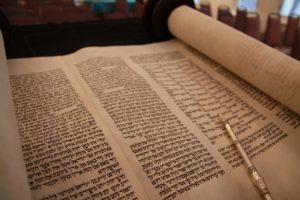 Background
Background